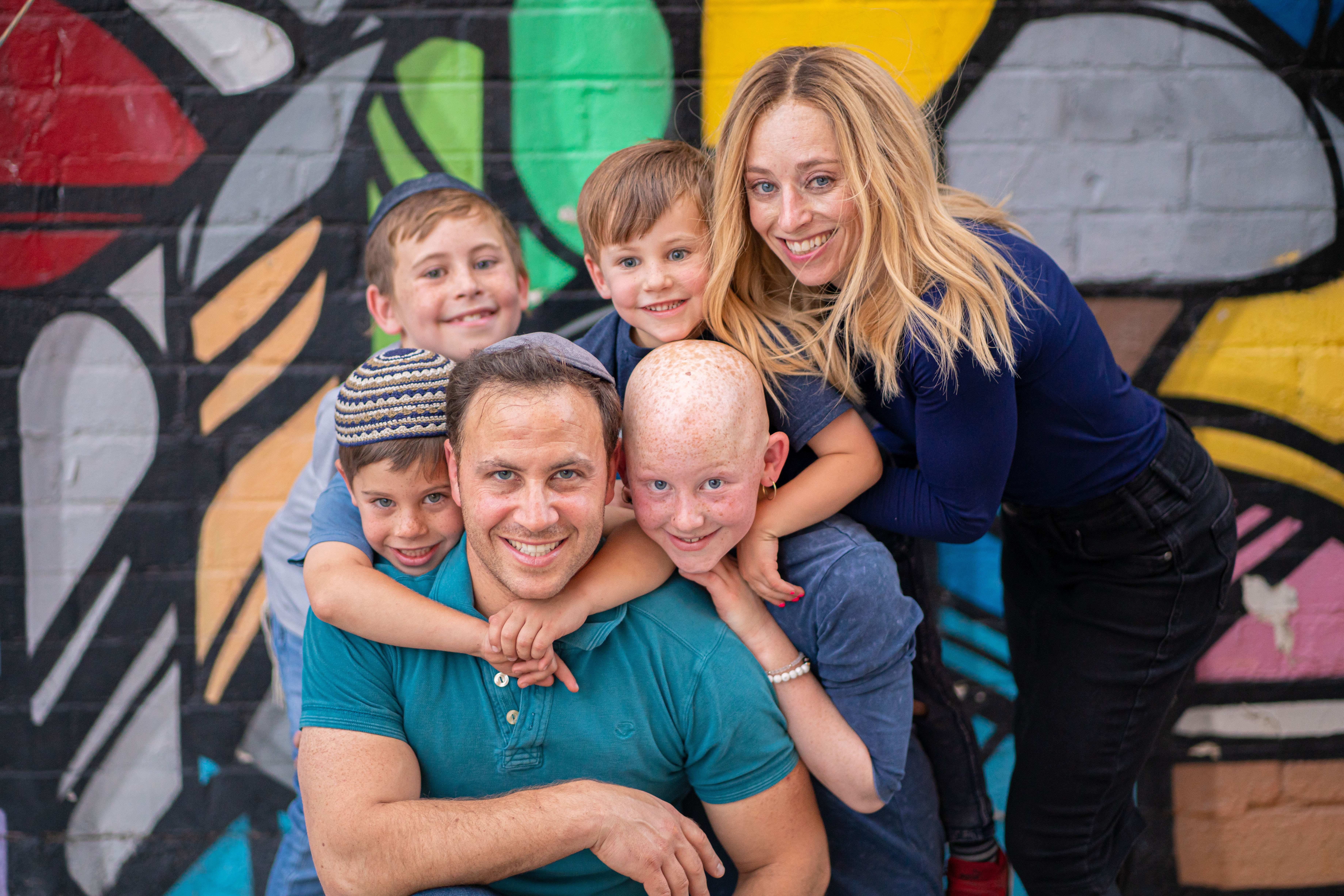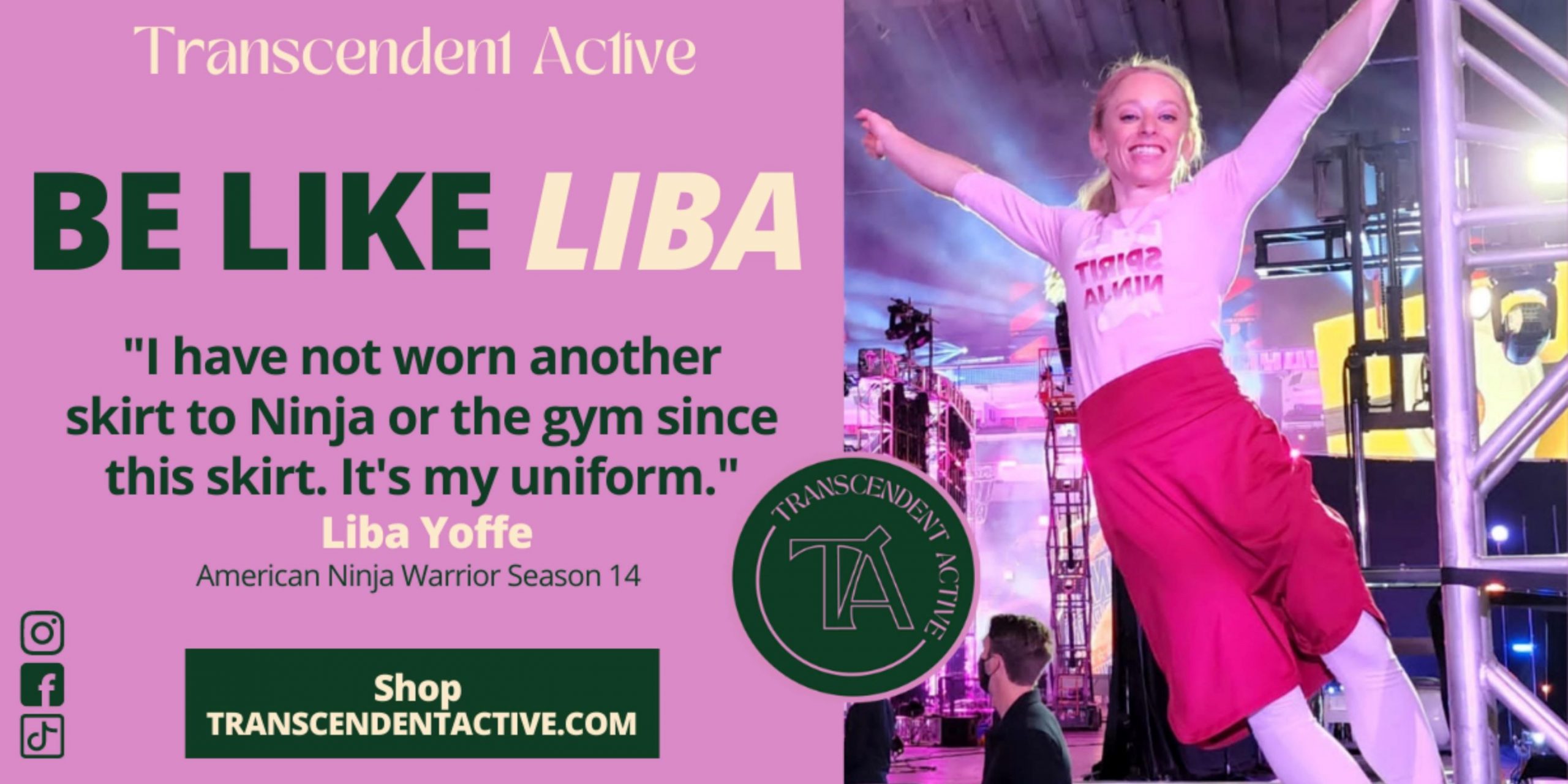A Jewish American Ninja Warrior
By Penina Taylor
At some point in their life every child suspects their mother is a “ninja”. But in the case of Liba Yoffe, there’s no doubt about it. This tiny force of nature is an Orthodox Jewish mom of four living in Phoenix, Arizona. She is also a two-time contestant on American Ninja Warrior, a long-running sports entertainment reality show in the US. It is based on a Japanese show called Sasuke. Sasuke shows air in over a dozen countries worldwide and involve the competitors (there are hundreds) to complete a series of obstacle courses of increasing difficulty. While the prize for winning a season can be a hefty jackpot – now up to $1,000,000, the chances of a woman winning it is pretty slim (a woman has never even earned the title “Last Ninja Standing” in the 13 seasons of American Ninja Warrior). Still, Liba is going to give it her best shot.
Growing up in an Orthodox home and going to Orthodox day schools meant that Liba didn’t have many opportunities to be involved in competitive sports. In fact, she had none. So how did Liba realize that she had a love for sports and physical fitness? She has her parents to thank for that. Growing up, Liba says that almost everything her family did for fun was outdoors and involved movement. Liba credits that with keeping her out of trouble as a teenager.
Most religious families don’t put such an emphasis on health and physical fitness, and in some circles both physicality and competition are relegated to the realm of “chol” – mundane things that have no place in the life of a religious person. Liba admits feeling like there was something missing during her school years and felt that it was unfair that Jewish schools don’t usually have sports teams. The idea of competing athletically was her childhood dream.
As an older teen and young adult, Liba began pursuing her dream and at the age of 18 she had already accomplished certification as a personal trainer.
Although she did go to college for several years, she says that school was never really her thing, so when she realized that she’d be a lot happier doing the things she already had certifications in – because she loved them – she stopped pursuing higher education and threw herself into the things she loved to do.
After marriage, Liba got certified as a doula and a childbirth educator – and this is what lights up her face when she talks about it. She feels like what she does now, with her business Spirit Fit Life, brings all of her years of experience and everything she loves all together in one place. It’s not just a holistic experience for those whom she coaches, but for herself as well.
Spirit Fit Life is a virtual coaching company where they help women become leaders of their lives – mind and body. She explains that it’s a high-level one-on-one customized program for fitness, nutrition, self-development, and business coaching. The focus is on mindset and how that affects every area of our lives. The program boasts a wide membership from pre-natal to retirees.
Liba credits her now-12-year-old daughter Tehilla with being the catalyst that really launched her into making this her life’s mission. Tehilla has alopecia, an autoimmune disease that attacks the hair follicles. The most severe form of which results in total baldness, which showed up when Tehilla was just 2 years old. Liba is very proud of the fact that in spite of her baldness, Tehilla is a super strong and confident young woman, but it didn’t happen by accident. When Liba realized what was wrong with her daughter and the implications of having a disease that causes complete baldness (especially for a girl), she became determined to raise her to be a strong, confident young woman – something important for every child, but all the more so for a child with the challenges that the alopecia presented. She instinctively knew not only that she wanted to raise a strong confident child, but that she herself needed to have that confidence – you cannot give what you yourself do not possess. That realization was the catalyst for the program she created – to help women not just become physically fit, but to become confident and strong themselves – something women tend to pass off as not so important, not realizing that they can’t raise confident healthy children if they aren’t there themselves.
As she began to work on herself both physically and mentally, she took on greater physical challenges. Liba explains that before she got involved in American Ninja Warrior, she was doing powerlifting (Powerlifting is a specific type of weightlifting that involves lifting extremely heavy weights in three specific types of lifts) and she was very good at it – breaking records even. But she was unable to compete at higher levels because the sport would not allow her to compete in a skirt.
One day, Liba received a message from another Jewish athlete, who was going to be competing in American Ninja Warrior. He suggested that she look into it because he thought she would be really good at it. Since she’s always up for a challenge, she took him up on it and checked it out. She had already decided that for her own personal benefit she was going to take up a new sport and get really good at it – just for fun. It turns out that American Ninja Warrior was the perfect sport for her in more ways than one.
Unlike most competitive sports – both “televised” and more traditional forms, ANW has no dress code. When Liba realized this was the case, it meant that as a woman who dresses modestly, her clothing would not present a problem for her being allowed to compete.
One of the biggest obstacles for Observant women who want to compete athletically at a really high level is the dress code. And although many sports organizations have now changed their codes to allow for body suits, which provides acceptable coverage for Muslim female athletes, it’s still a problem for most Observant Jewish female athletes who must wear skirts. This, more than theology, is the biggest hurdle for Jewish women who want to compete athletically to overcome.
The fact that ANW has no dress code opened the door for her to be able to compete. Fortunately for Liba and other Orthodox athletes like her, there are now companies like Transcendent Active (see last month’s feature story) that make modest athletic wear suitable for competition.
The way you get started preparing for “Ninja” is that there are Ninja gyms around the US, and that’s where you train. So Liba looked up a Ninja gym in her area and discovered that not only was she good at it – but that it was really a lot of fun. Of course, everyone has their own definition of “fun”. As Liba was describing Ninja, she explained that it’s extremely challenging and even scary, and of course humbling, because you fall a lot – not my definition of fun.
Do what you believe is right – you don’t need permission from anyone else.
Liba Yoffe
But it didn’t take long for Liba to realize that competing in this sport was a whole lot bigger than just her. Being the first woman to show up on the show in a skirt and long sleeves, she’s representing a whole segment of society that has been marginalized in competitive sports, purely because of dress code. And that’s a big deal. She says she gets letters all the time from women, young and old, thanking her for representing them and showing them that they really can do whatever they want to do. But she also feels like her exposure is a “Kiddush Hashem” because it shows Observant Jews in a positive light to the rest of the world – that here’s someone who stands by what they believe in, but also isn’t afraid to be “out there”. Representation is important.
I asked her about covering her head for these competitions. Liba wears something called a “Wonder Wig” which is designed specifically for an active lifestyle. It’s a ponytail “fall” (a partial wig designed to be worn with a headband or a hat) and it has multiple clips so it doesn’t slip.
When asked if she’s had any challenges other than clothing, she shared that last year’s competition fell out on Pesach. Although the show was very accommodating – allowing her to arrive in the evenings, so she could come after Shabbat or chag were out – just organizing the whole thing was complicated. The competition took place in Seattle so if she didn’t want to spend Pesach alone, the entire family had to fly out to Seattle. That meant not just arranging accommodation but providing for the seder and a week’s worth of kosher for Passover food – in a city with a small Jewish community. This year the competition took place right after Purim, so there weren’t as many complications. As we were doing our interview she was gearing up for the competition, so we have no idea how she did. The show is due to air June 6th, so we’ll have to wait until then to find out.
Liba says that she didn’t do especially well on the first competition, she found out about it so late that she only had three months to train for it. On top of that, she is the only person she knows who had never been to a local competition because they are always held on Shabbat. Being in a competition of this magnitude also involves more than just physical ability. Most of the people who compete in American Ninja Warrior have been competing most of their lives – high school and college sports, for example – something Liba had never experienced. Besides being physically capable, one has to deal with the pressure of competition, something Liba says she was definitely not prepared for the first time. The pressure of having everyone watching her and of knowing that she was representing the Jewish people caused her to lose focus, something that can be disastrous in a high-level athletic competition. So in that first competition, Liba fell pretty quickly – falling knocks you out of the competition. She said that this time around she feels much more prepared, not just physically but mentally.
This time around, she just wants to show up and do her best and she’ll be proud of herself, no matter what the outcome.
When asked what advice she’d give to someone who is maybe older or in poor health, she immediately responded that it’s never too late. She cites a client in her 60s who says she now feels healthier than she did in her 40s. So it’s never
too late.
But, Liba says, you can’t have the physical strength until you first address what’s going on in your head. She explains that if she didn’t face her inner fears, there is no way she could have succeeded in doing this physical competition; what’s going on in your head directly affects your body, and that’s an important part of why she does what she does, not only for herself, but also for her clients.
When asked what advice she’d give to an Orthodox woman who is interested in pursuing a less-than-traditional path, either career or hobby, she says that if you are afraid of being judged, remember nobody in the world knows your relationship with God besides you, nobody can judge that. Nobody. So then what is there to care about? Because it’s not about the outside. Do what you believe is right – you don’t need permission from anyone else. You don’t need it – if you are confident that what you are doing is right, there’s nothing to worry about. It’s the classic phrase – own your truth. The world is not black and white and our relationship with God is not black and white. There are so many different ways to be an Observant Jew and the important thing is that we keep working on ourselves and our relationship with God, and if you feel that there’s something wrong, you are the only one that can judge that, and no one else.

If you want to keep up with what Liba is doing, you can follow her on Instagram @liba.spiritfitlife or on Facebook at facebook.com/LibaYoffe.SFL, and you can learn more about Spirit Fit Life at Spiritfitmama.com.






